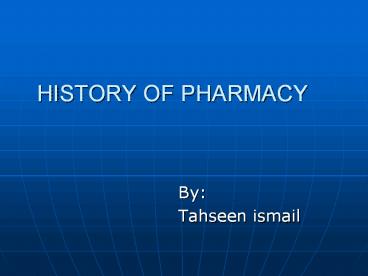HISTORY OF PHARMACY - PowerPoint PPT Presentation
1 / 34
Title: HISTORY OF PHARMACY
1
HISTORY OF PHARMACY
- By
- Tahseen ismail
2
PHARMACY
- Pharmacy is the art of preparing designing
medications and the provision of drug related
information to the public. - American Pharmaceutical Association describe the
mission of pharmacy as serving society as the
profession responsible for the appropriate use of
medications, devices services to achieve
optimal therapeutic outcomes.
3
- According to report of commission of Pharmacy
- Pharmacy should be conceived basically as a
knowledge system that renders a health services
by concerning itself with understanding drugs and
their effect.
4
History
- Why to study History of pharmacy?
- Study of History tells
- How the concept of drug evolved over time
how a separate profession arose to prepare drug
into medicines in the West or entire world.
5
- Throughout history drugs have directly influence
the lives of millions e.g - Drugs like Insulin, antibiotics
chemotherapeutic agents have saved thousands of
lives.
6
Prehistoric Pharmacy
- Pre-historic people gathered plants for medicinal
purpose. - Tribal healers or Shamans had recognition of
mastered by all who practised the domestic
medicine of household. - Early people explained illness in super natural
terms (like other changes disasters around
them).
7
(No Transcript)
8
(No Transcript)
9
(No Transcript)
10
(No Transcript)
11
(No Transcript)
12
(No Transcript)
13
- Shaman had duty of magical potions for curing
by which they diagnosed treated service illness
he/she compounded remedies needed to stave off
the influence of evil spells or spirits. - Thus drugs were derived as both simple tools
special substances with supernatural power.
14
- Even early people discovered only a small amount/
number of effective drugs, but the concept of
influencing bodily functions via an outside force
must be considered as humanity greatest advances.
15
EGYPTIAN ERA
- When organized settlements arose in great fertile
valleys of Nile, Tigris Euphrates Indies
River changes occurred that gradually influenced
the concept of disease healing. - Egyptian medicinal texts show close connection
between supernatural empirical healing.
16
- They we plant drugs having main vehicles of
healing powers like laxatives enemas were
prominent. - They specialized in preparation sale of drugs.
- Eber-papyrus begins rational use of drugs by
developing clay tablets papyri.
17
BABY LONIAN ERA
- Provide medical care by 2 classes
- 1.Aspus (Magical healers)
- 2.Asu (Empirical healers)
- Asipu Related on spells use magical stones.
- Asu Used medicinal plants manipulated them
into several dosage forms like suppositories,
pills, washes, enemas ointment.
18
GREEK-ROMAN ERA
- Gave mixed concept of drugs or pharmakon, a
word that meant magic spell, remedy or poison. - homer (800 BC) refers to medical wisdom of
Egypt homer described physicians by the
demiourgos which advanced to diagnosed natural
cause of illness.
19
- Different pharmacist Thales (590 BC),
Anaximander (550 BC) Pharmenides (470 BC),
Empedocles (450 BC) Hippocratic writers develop
rational explanations of illness. - Materia medica by Dioscorides, the standard
of drug.
20
THE RENIASSANCE
- Beginning of Modern Era after dark age(400
AD-1453 AD). - In 1453 AD Constantinople (Istanbul), fell to the
Turks remnant of Greek scholarly society fled
to the west carrying their books knowledge with
them.
21
- New concepts of diseases drugs arose.
- Valerians Cordus work on formula book having name
as Dispensatorium becomes standard book for
preparation of medicine.
22
- Paracelsus chemically prepared the drugs from
crude plants minerals. - 1604 Louis Heberg 1st pharmacist in north
America. - W- harvey in 1628 circulation of blood.
- Leeuwan hoel in 1680 discovered yeast.
23
- In 1703, English Apothecaries authorized to
prescribe as well as to dispense. - 1736 1st law related to pharmacy develop in
Virginia (America).
24
MODERN PHAMACY
- Modern Era started after industrial Revolution in
1750. - 1st hospital Pharmacy in 1752 in Pennsylvania
(America). - In 1756, John Morgan supported prescription
writing in USA. - Collage de-Pharmacia in parts in 1777 (1st
collage of pharmacy).
25
- Edward Jenner vaccination work in 1798.
- 1848 1st American code of Pharmaceutical Ethics.
- 1848 1st drug import Law by Congress.
- 1868 Modern education on Pharmacy in Michigan
University.
26
- 1888 1st National formulary by American
Pharmaceutical Association. - 1893 Aspirin by A-Eichergrum felix Hoffman.
- 19511st national Pharmacopoeia by WHO.
- 1906 FDA act of USA.
27
ISLAMIC ERA
- The crescent of Islam rose from the horizons to
enlighten the faculties of Basic laws of
nature. - Arabs rejected old concepts and ideas because of
new drugs species as they conquer new areas. - More elegent palatable dosage forms e.g pills
syrups.
28
- 1) JABIR BIN HAYAN (721-815 AD)
- GEBER in the west.
- Prepared Nitric acid, Sulphuric Acid,
Hydrochloric Acid. - God Father of modern chemistry.
- Chemical technique Sublimation distillation,
melting crystallization. - Composition of Alchemy.
29
- 2) ABU ISHAQ KINDI
- 20 books.
- Posology (study of dose of drug).
- De Medicinarum Compsitarum.
30
- 3) ZAKARIYA ALRAZI (865-925AD)
- RHAZES in the west.
- Father of pediatrics.
- Arbian Medicine.
31
- 4)ABU ALI SINA (980 AD)
- Avicenna in the west.
- Al Qannun fil tib.
- 230 books
- First to use catheters made of the skins of
various animals. - Intravesical injections by means of silvers
syringe.
32
- 5) IBN AL-HAITAM (975-1039AD)
- Al-Hazan in the west.
- Great optician.
- Discovered magnifying lenses.
- Function of retina.
- Kitab Al-manazir,mizan-ul-hikma
33
- 6)IBN AL-BAITAR
- Collect different plants from Paris to Syria.
- Discovered new plants and extracted medical
drugs. - Jami (book name).
34
- 7)ABUL QASIM ZAHRA(936-1013AD)
- Mamoon in the west.
- Invented surgical instruments(200).
- Placed artificial tooth instead of diseased.
- AL-Tasrif (medical encyclopaedia).































